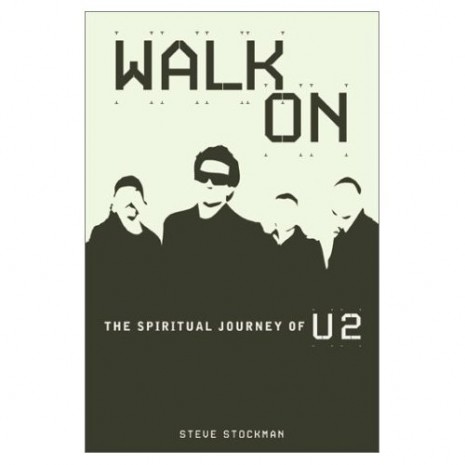Just finished the book Walk On: The Spiritual Journey of U2 by Steve Stockman. It encouraged me in a surprising way, kind of affirming me with what I do with HM Magazine. The book accomplishes something that it doesn’t really set out to do (I think). It serves as an apologetic for the quantity and quality of “Christian” of their musical art. This is probably something that bothers and unnerves the folks around U2 and the author. It’s like Jesus or the Apostle Paul having to defend the fact that they are holy people. It’s like, “Come on! Get real!” It’s hard to understand the vitriol and vindictive judgment that is cast upon people sometimes.
I think of a line from a song I wrote (look out! egotistical moment here), called “Leave Amy Alone.” It says,
“…that all this energy you’ve been wasting … it was all in vain…”
While I and many fans of the band don’t need to be argued into considering the music of U2 as very important, special, biblical and spiritual (coming from a Christian worldview), it is exciting to be affirmed of these things with the keen and focused inspection of the band throughout their entire career (from its inception to the How to Dismantle an Atomic Bomb album). Such a great band.
So, HM Magazine tries to take a stand against propaganda and show the shallowness of an “us vs. them” and/or a “secular vs. sacred” mentality. We see the error of calling any type of music, art or creative product as “Christian.” Jon Foreman of Switchfoot said, “I’m Christian by faith, not genre.” While the label is flawed, it is one we wave and operate under. It’s what it is.
I remember hearing Kemper Crabb talk about the difference between art vs. propaganda and how propaganda was not really “art.” This was at the same time that he was producing an album for my old band (what!? two references to your stupid, old band, Doug? You idiot!). I asked him how and why he would produce a band that surely fit under the label of propaganda. I mean all of our songs followed a theme of following Christ, citing the bible for each subject taken on (sexuality, speaking in tongues, demons, grace, judgment). He acknowledged that LC was part of Christian rock as a genre and an industry, yada yada yada, but that he thought we were doing something vibrant or something like that. I can’t remember exactly what he said, but he made it sound like we were not just throwaway “trash” art or complete utilitarian music.
What I’m getting at is Stockman’s book is like a contradiction. It focuses on the good and the light and uncovers the evangelical and distinctly Christian (or Christ-like) nature and motive behind the art of a band that fits securely on its own footing in the giant music world we call “mainstream.” They are totally in the world but not of it (though the band themselves would probably argue that they’ve crossed the line into and “of” worldliness).
HM Magazine celebrates and champions art that fits outside the four walls of the church − vibrant, living art that is both dangerous and compelling with the life-giving power of God. It does this, however, while it is steeped squarely inside the Christian music industry. Our magazine is sold both inside and outside of Christian bookstores, a few church satellite bookstores. We willingly submit to certain codes of conduct and behavioral expectations in order to not get us into too much trouble within this sheltered environment; though we do, hopefully, stir the pot up and cause some discomfort and trouble − like any prophet (an office we don’t necessarily hold or claim but would instead be honored to act with this gift, not so much as claim the title). In other words, we have a few contradictions of our own.
It’s been neat to sometimes education, edify and/or rebuke the Christian hard music scene we cover and serve. It’s also gratifying to see HM Magazine make inroads into the mainstream music world and have some level of respect for doing what we do (hopefully) well.
This book is one that I didn’t have to read. What I mean by that is that so often I have several books I need to read for review purposes in HM Magazine. I have a ridiculous pile of books that I want to read. Sometimes the pile in my nightstand becomes so large that I need to clean out and manage which books will stay (and get read soon) and which will go on a shelf somewhere else. It’s frustrating that I don’t have the relax or “free” time to read more. I have to force any reading I do, pretty much. During several re-arranging exercises of my nightstand books, I have kept this one nearby. I’ve really wanted to read it, even though we reviewed it in HM long ago. I had to take it in bits and pieces, but I’m glad I did. I’m glad that I finally finished it today, the first day of 2011.
And now for something completely different. While the subject of “prophetic” has come up, I want to bring up something I read a long time ago. I’m not sure which book about Keith Green it was in (probably No Compromise), but it talked about a concert he was doing at ORU (Oral Roberts University) in Tulsa, OK. A revival had come to the campus and the Keith Green concert happened to occur right in the middle (or possibly the end) of it. Like what often happens during a revival, an awareness of the holiness of God and our sinfulness comes into view. Apparently students from ORU were using an open mic on stage (I think Keith Green was bowed under his piano, praying and weeping) and one-by-one students were confessing their sins. One young man came up and confessed that, while he was popular (I think he was the student president or something like that), he was caught up in homosexuality and promiscuity. It was a shocker, since he was a student leader and well respected, but in the context of a true move of God, it probably didn’t phase the students caught up in it.
‘Of course he confessed a sin … we all are!’ is probably the thought on the minds of most. No big deal. It’s now covered by the precious blood and grace of Jesus the Messiah/Savior/Lord. But a school official quickly came up to the microphone to put a stop to these confessions. “…some of these things are best dealt with in private…” this guy said (I’m paraphrasing with possibly a very suspect memory, forgive me). I think he also added that the school “would not punish this guy for this revelation,” which is nice and shows some pastoral care but still comes off as interuptive. I think Keith described the result in his book. It was something like, “Whoosh! You could almost feel the Holy Spirit leave the room.”
Way to go, administrator! Squelch a revival, why don’t ya? What a bummer. Now, this whole story is one of those events that is impossible on this side of Heaven to verify, but I have a tendency to believe reports like this. Sometimes we try to control God. One of the best things about grace, in my opinion, is that we can let a mess happen. Cleaning up with grace is something that is surely possible. Giving room for the dangerous can be a very good thing. That’s one thing I appreciate about U2 and the position that they have kept themselves in. Dangerous art is sometimes the very best. The risk can have a great reward.
If God put me in charge of handing out awards in Heaven for musical achievement for the kingdom of God (what a concept! Certainly not something I deserve in any way), I would want to spend a LOT of time in the “film room,” checking out “nobodies” and obscure artists who practiced their craft out from under the radar of popular media. But I think this band is great.


Comments